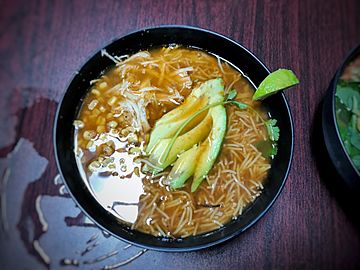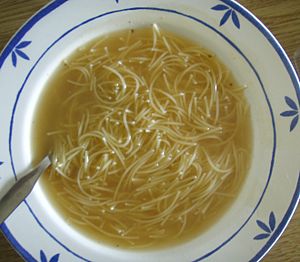Sopa de fideo facts for kids
Sopa de fideo (sometimes called sopita de fideo) is a yummy noodle soup. It's popular in countries like Spain, Mexico, and the Philippines. It's also a big part of Tex-Mex food, which mixes Mexican and American styles. Many people think this soup first came from Spain.
Contents
What Does 'Sopa' Mean?
The word sopa means 'soup' in Spanish. But in some Mexican-American cooking, sopas can also be side dishes. These are often served with the main meal.
About Sopa de Fideo
Sopa de fideo is a noodle soup made with a flavorful broth. It's a favorite in Mexican cuisine and Tex-Mex cooking. The word fideo means 'noodle' in Spanish. People often use fideos (plural) to talk about the thin noodles, like vermicelli.
What's in the Soup?
The noodles for this soup are usually very thin. Cooks often break or cut them into smaller pieces. Then, they lightly brown the noodles before adding them to the soup. This step gives the noodles a nice flavor and texture.
Traditional fideo noodles are used, but sometimes people use vermicelli or even angel hair pasta. You can often find fideo noodles in Latin grocery stores.
Other ingredients can include:
- Vegetables like bell peppers, onions, and garlic
- Tomatoes or tomato sauce
- Chicken
- Chili peppers
- Vegetable oil
- Salt and pepper
Why People Love It
Sopa de fideo is a great meal because it's usually cheap to make. It's also very tasty and filling. Many people think of it as a comfort food. This means it's a dish that makes them feel warm, happy, and safe.
History of Sopa de Fideo
The sopa de fideo soup first came from Spain. It is still eaten all over Spain today. For example, people in Cavite, a province in the Philippines, learned about this soup from Spaniards in the 1600s. It quickly became a comfort food there too.
In 1982, a book called Handbook of Mexican American Foods described sopa de fideo as a Spanish-style vermicelli. It said it was made in the same way as sopa de arroz (rice soup).
Images for kids
 | James B. Knighten |
 | Azellia White |
 | Willa Brown |




